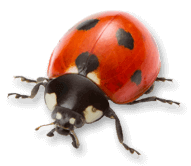
Integrated Pest Management
Integrated pest management (IPM) is a sustainable approach to pest and vegetation control that utilizes regular monitoring to find pest problems and to determine if and when action is needed. The IPM approach emphasizes physical, mechanical, cultural, and biological methods to keep insect, animal or vegetation problems low enough to prevent intolerable damage, annoyance, or public safety hazards.
Use mulch, pull weeds, fertilize lawns, use water spray or sticky traps, clean up diseased leaves or try a variety of other biological, cultural or physical controls. When chemical controls are necessary, they should be the least toxic or least hazardous available and used only when no other control methods would be effective or practical.
An important part of IPM is to accurately identify your pest problem before taking actions to control them. For assistance in identifying insects, weeds, and plant diseases; please contact a licensed pest control company or your nearest WSU Extension Master Gardener program: http://mastergardener.wsu.edu/program/county/
Noxious weeds threaten public health, the environment, wildlife habitat, native plants, agriculture areas, and recreational areas. Control of certain noxious weeds is very important to our natural environment and may be mandatory where you live. Please visit the Washington State Noxious Weed Control Board to find out more information about the noxious weeds in your area (http://www.nwcb.wa.gov/).
IPM fact sheets for the control of specific nuisance pests and noxious weeds:
Nuisance Pests: Noxious and Invasive Weeds:- Annual Bugloss
- Bindweed
- Blackberry
- Blueweed
- Canada Thistle
- Common Bugloss
- Common Fennel
- Creeping Buttercup
- Dalmation Toadflax
- Diffuse Knapweed
- Disease - Garden
- English Ivy
- Garden Loosestrife
- Giant Hogweed
- Gorse
- Herb Robert
- Horsetail
- Knotweed
- Meadow Knapweed
- Milk Thistle
- Moss
- Mouseear Hawkweed
- Old Man's Beard
- Orange Hawkweed
- Pampas Grass
- Perennial Pepperweed
- Perennial Sowthistle
- Phragmites
- Poison Hemlock
- Poison Oak
- Purple Loosestrife
- Quackgrass
- Reed Canary Grass
- Rush Skeletonweed
- Scotch Broom
- Scotch Thistle
- Shiny Geranium
- Slenderflower Thistle
- Spotted Knapweed
- Spurge Laurel
- Stinging Nettle
- Sulfur Cinquefoil
- Tansy Ragwort
- Western Bracken Fern
- Western Water Hemlock
- Wild Chervil
- Yellow Flag Iris
- Yellowdevil Hawkweed
Didn't find your pest problem? Check these websites for more IPM control options:
- Washington State University: Pestsense - Insect control guides
- Washington State Univeresity: Hortsense - Control guides for landscape and garden plant problems
- Washington State University Extension, Snohomish County - Vertebrate Pest Management
- Washington Department of Fish and Wildlife - Nuisance Wildlife
- Oregon State University: Moss
- Didn't find it yet? Check More Resources
